1981 Hunger Strike Truth Commission
Rusty Nail at Slugger O’Toole
Saturday evening’s meeting in Derry could be described as a grassroots Truth Commission – clearly, the public’s desire for truth and expanded knowledge of the events of the Troubles is overwhelming, enough so that people are not waiting for officialdom to create yet another useless quango in order to get to it. They are, despite all the odds stacked against them, doing it for themselves. They aren’t seeking compensation or appointed positions: they merely want those who were there to stand up in public and tell the truth of what they know. Brendan Duddy to his credit in Derry made quite clear that was the only thing he was interested in, noting that he was in his seventies and that he had no interest or need to keep anything back. He was there on the night to tell the truth as he knew it. Gerard Clarke, likewise, made a point to put say in public what he knew, for the simple reason that it is the truth, and the it is truth being asked for.
It is understood that Gerry Adams has today sent a letter to some of the families of the hunger strikers.
One of the key points of the meeting was the presentation of the British offer that went into the prison, as read by Liam Clarke, the Sunday Times journalist who has been following the 1981 Hunger Strike story and making Freedom of Information requests for documents relating to British government activity in regards to the prison protests. This document was confirmed by Brendan Duddy, the link between the British government and the Adams committee, as the offer he ferried in early July. This was also confirmed by Richard O’Rawe as the offer Bik McFarlane outlined to him, which they agreed to accept; that conversation was corraborated as taking place by Gerard Clarke, who overheard it at the time, and also by testimony from Willie Gallagher of the IRSP who are in possession of transcripts of a recording where another former prisoner also confirms the conversation took place. Videos of the meeting are currently on YouTube and the IRSP and RNU’s recordings of the public discussion will also be available online shortly. In the meantime, Slugger presents the offer the British made, and a transcript of Willie Gallagher’s opening speech.
Liam Clarke gives the background to the British document*:
“The NIO has several drafts of this document on file, which differ only in minor detail. This was one which Thatcher authorised to be sent to the IRA on July 8th 1981. The letter from Downing Street to the NIO sent on that date (and on the Sunday Times website) describes it as as “a draft statement enlarging upon the message of the previous evening but in no way departing from its substance” It went on “if the PIRA accepted the draft statement and ordered the hunger strikers to end their protest the statement would be issued immediately. If they did not the statement would not be put out.” At the meeting in Derry Brendan Duddy said this draft statement set out the offer which he had sent to the IRA on 5th and which, he said, was rejected by the IRA.
In the NIO documents, for a letter from Downing Street to the NIO on July 18, it is made clear that the offer on clothes is “that the prisoners would be allowed to wear their own clothes, as was already the case in Armagh prison, provided these clothes were approved by the prison authorities.””
*You can also watch his presentation at the meeting online: Liam Clarke (Part 2) speaks at the truth behind the hunger strike debate (relevant part starts @2mins in)
Statement by the Secretary of State for Northern Ireland
1. In the light of discussions which Mr Michael Alison has had recently with the Irish Commission for Justice and Peace, during which a statement was issued on 4 July on behalf of the protesting prisoners in the Maze Prison, HMG have come to the following conclusions.
2. When the hunger strike and the protest is brought to an end (and not before), the Government will:
I. extend to all male prisoners in Northern Ireland the clothing regime at present available to female prisoners in Armagh Prison (i.e. subject to the prison governor’s approval);
II. make available to all prisoners in Northern Ireland the allowance of letters, parcels and visits at present available to conforming prisoners;
III. allow the restoration of forfeited remission at the discretion of the responsible disciplinary authority, as indicated in my statement of 30 June, which hitherto has meant the restoration of up to one-fifth of remission lost subject to a satisfactory period of good behaviour;
IV. ensure that a substantial part of the work will consist of domestic tasks inside and outside the wings necessary for servicing of the prison (such as cleaning and in the laundries and kitchens), constructive work, e.g. on building projects or making toys for charitable bodies, and study for Open University or other courses. The prison authorities will be responsible for supervision. The aim of the authorities will be that prisoners should do the kinds of work for which they are suited, but this will not always be possible and the authorities will retain responsibility for decisions about allocation.
3. Little advance is possible on association. It will be permitted within each wing, under supervision of the prison staff.
4. Protesting prisoners have been segregated from the rest. Other prisoners are not segregated by religious or any other affiliation. If there were no protest the only reason for segregating some prisoners from others would be the judgment of the prison authorities, not the prisoners, that this was the best way to avoid trouble between groups.
5. This statement is not a negotiating position. But it is further evidence of the Government’s desire to maintain and where possible to improve a humanitarian regime in the prisons. The Government earnestly hopes that the hunger strikers and the other protesters will cease their protest.
Transcript of Willie Gallagher’s opening speech, appended with post-meeting observations:
“What is the truth behind the Hunger Strike 23-05-09-The Gasyard in Derry”
In early 2005 Richard O Rawe’s book ‘Blanketmen-An untold story of the H-Block hunger strike’ was published. In that book he made an explosive and controversial claim that he and Bik, on behalf of the jail IRA leadership, accepted a British offer made on 5th July 1981 to end the hunger strike. He claimed that four of the five demands were in effect conceded and that these were passed to him by Bik, who received them from Danny Morrison. He claimed he studied the comm for a number of hours and then shouted to Bik, who was two cells away, that there was enough there. Bik agreed and stated that he would comm outside accepting. The following day a comm from the outside IRA leadership rejected their acceptance.
Richard’s claims were immediately rubbished by SF leaders mainly Danny Morrison, Jim Gibney and Bik McFarlane in TV and radio interviews and also in the press. There was a multitude of interviews and press statements from them in what seemed an uncoordinated manner as there were glaring contradictions in their various positions on the claims.
Bik on UTV live on 1st March 2005 denied that any offer of any sort was ever made by the British at any point. Also in March 2005 in an interview with the Irish News Bik stated ‘’There was no concrete proposals whatsoever in relation to a deal.? He goes on to deny that the acceptance conversation with Richard ever took place.
Danny Morrison in the Irish Times on 5th February 2005 said ‘’It is telling that not once in 24 years has the NIO stated that before Joe McDonnell’s death it made an offer to the hunger strikers which was turned by the IRA’s army council.? Even though Danny contradicted Bik by saying that there were offers being proposed by the British but he stated that none of them were concrete. Bik later retracted his earlier claim in other press briefing that there were no offers and said he meant to say no deals.
Jim Gibney said in the Irish News on 12th May 2006 that ?Joe McDonnell died on 8th July –the British did not offer an agreement before he died.?
Those are just some of the multitude of examples of SF’s public position on the O Rawe claims and the debate turned into one of semantics of what constituted an offer or a deal. They steered the debate away from the IRA jail leadership’s acceptance claim and focussed instead on semantics over the definition of deals and offers but maintained that there were no concrete offers and because there were no concrete offers therefore the IRA jail leadership could not have had, in Bik’s words, ?accepted something that didn’t exist.?
During this period there was a demonisation campaign waged by SF against Richard using their old and tested tactic of demonising and smearing the messenger in order to rubbish the message.
During this period of 2005-2006 the IRSP, at first, were merely interested observers but were also very sceptical about the claims. We did not want to believe O’Rawe: we did not want to think that the IRA leadership would undermine the authority of the prisoners and reject the offer. Even more importantly we could see no concrete evidence that supported his claims despite the contradictory rebuttals by SF. A number of our ex-prisoners and some relatives of our hunger strikers began raising questions on the claims and asked us to investigate them. At that point we knew absolutely nothing at all and we set up a series of meetings with senior members of the IRSP and INLA Army Council members who were involved in the strike at that time as well as with Rab Collins, the INLA H-Block OC. All of them stated that they had no knowledge whatsoever about a substantial offer being made, nor of the acceptance by the IRA jail leadership or indeed of the mountain climber initiative.
The turning point in the controversy for the IRSP came after a publicised interview by Anthony McIntyre with Richard O Rawe which appeared on a website called ‘The Blanket’ on the 16th May 2006. A key paragraph in that interview jumped out at a number of us who were closely following the debate and it is worth quoting here again-
’‘Q: Indeed. I think you realise there is a bit more than that. As you know I have enormous time for Bik. It goes back to the days before the blanket. But I can only state what I uncovered. I am not saying that it is conclusive. These things can always be contested. But it certainly shades the debate your way. If Morrison and Gibney continue to mislead people that there is no evidence supporting your claim from that wing on H3 I can always allow prominent journalists and academics to access what is there and arrive at whatever conclusions they feel appropriate. That should settle matters and cause a few red faces to boot. We know how devious and unscrupulous these people have been in their handling of this. They simply did not reckon on what would fall the way of the Blanket. Nor did I for that matter. A blunder on their part.’‘
ELABORATE. IRSP/confidentiality agreement. ***Last night I done this part from memory but will give a summary here of what was said – WG ***
There was contact between the IRSP and those who had possession of this evidence and after some negotiations we agreed to certain preconditions that were being placed upon us. Bear in mind that we did not believe O Rawe at this point, did not want to believe him and wanted to report back that there was no real evidence so that we could go round our Hunger Strikers families and say ?ignore what you hear and read about O Rawe’s claims—they’re not true.? We thought we would put the controversy to bed and little did we realise the opposite would happen. Jimmy Bradley, a senior IRSP person from Belfast were presented with this evidence which turned a sceptic and a non-believer in believing that there were indeed serious questions to be answered. In fact we believed Richard was telling the truth. We agreed beforehand that we could not talk about the content or nature of the evidence, until given permission to do so, but could only sum up whether we believed O Rawe or not. We believed him! We reported back to our leadership who instructed us to set up an ad hoc committee to investigate further.)
In June/July 2006 the IRSP met with Colum Scullion, Richard’s cell mate, in the presence of Mickey Devine for over an hour. He sated a number of times that he could neither confirm nor deny the claims that Richard made. He said that there were some things about the Hunger Strike that he couldn’t talk about and that was one of them. I pointed out to him that if what Richard claimed was untrue then it was an outrageous slanderous lie which was having an adverse impact on Mickey, his family and all the other families and that could he not now reassure Mickey that the claims were untrue. He again stated that he would neither confirm nor deny the claims.
We then briefed the INLA Hunger Strikers families as to our investigation but due to our hands being tied with the confidentiality agreement we could not tell them the nature or content of the evidence that was presented to us.
The controversy then remained out of public viewing until March 2008 when Eamon McCann in a radio interview verified Richard’s claims. Eamon based his claims on conversations he had with Brendan Duddy who he describes as the mountain climber and Colum Scullion. This time SF learnt lessons from 2 years prior when they were full of contradictions and untruths. They remained silent but were able to produce Colum Scullion to counter the claims. Scully inadvertently, despite rubbishing the acceptance conversation, added weight to Richard’s claims by saying Bik did indeed make Richard aware of an offer on July 5th.
In March 2009 we became aware of documents that were released under the Freedom of Information Act prior to their publication in the media. Put together, these documents suggest that Margaret Thatcher proposed a deal with the IRA to end the hunger strike. This was first given “privately to the IRA on July 5th” according to the documents.
A further message was approved by Thatcher on the evening of July 7th and communicated to the IRA on the afternoon of 8th July. The documents further suggest that the IRA was cool at first but later in the day said that only the tone, and not the content, of the offer was unacceptable. As a result, a further draft statement, enlarging upon the previous British statement, was communicated to the IRA for their consideration. The documents say the IRA was advised that if they accepted this statement and “ordered the hunger strikers to end their protest” then the statement would be issued immediately. Otherwise a statement would be issued re-iterating the British government position of June 30th.
On the afternoon of July 18th the IRA asked for an official to go into the Maze to meet the hunger strikers. The British intention was that the official would explain the offer on clothes set out above and clarify a previous private offer on work. However, after some discussion, the British decided not to proceed without a prior indication of acceptance by the IRA. The documents clearly support Richard’s version of events and disputes the SF version of no offers of substance.
We once again spoke to senior members of the 1981 IRSP/INLA, the H-Block OC and the families of the INLA hunger strikers families and briefed them all on the documents. The IRSP executive then drafted a press release based on all the information uncovered in their investigation and stated that the 1981 leadership of the IRSP/INLA and the H-Block OC would have ended the INLA involvement in the Hunger Strike if they had have had this information at the time. All of them claimed that they were kept totally in the dark about the Thatcher negotiations or acceptance by the IRA prison leadership of an offer made on July 5th.
On the 6th April SF in the Irish Times denied the Sunday Times claims and bizarrely stated that the documents were a part of a British military intelligence conspiracy. The IRSP on the internet pointed out that the only evidence of a British intelligence intervention was that which SF promoted with the John Blelloch interview who they claimed was an MI5 agent. SF quickly done a U-turn on this claim and welcomed the documents claiming, again quite bizarrely, that they supported their version of events.
SF’s position is now shifting from ‘no offers whatsoever’ to ‘no concrete proposals whatsoever’ to according to Barbara de Bruin on 2nd May 2009:
?There were negotiations, there was an offer, in fact a number of different offers but as the British refused to sign anything or give a public commitment to move before the hunger strike ended there was no ‘deal’. Due to the way the British government had acted in the wake of the first hunger strike the hunger strikers wouldn’t end their fast without some form of public guarantee.
Indeed, the timeline published by the Bobby Sands Trust also shows that the British government refused to meet the hunger strikers and stand over their offer.?
It is worth rewinding back to Jim Gibney’s public statement on March 2004 when during a speech on the anniversary of Bobby Sands 50th birthday he said, ?I was shown a comm written by Bobby Sands that had come out of the prison the previous day(the day the first Hunger Strike ended). The following sentence stuck out: “I will begin another hunger strike on the 1st January.” SF’s position now seems to be relying on British duplicity at the end of the first Hunger Strike by claiming that the British reneged on a deal therefore it was imperative that the Brits stand over any offer they made. Why would Bobby Sands be writing a comm on the night the first Hunger Strike collapsed about going on another Hunger Strike if there was an alleged deal? Danny Morrison appeared on RTE, the same day Jim received this comm, saying that Bobby was ?jubilant.? All the main players including of course the Brits knew that no deal was reneged on so why maintain this pretence and preconditions over an alleged deal that didn’t exist.
The day following the Sunday Times exposes Danny Morrison inferred that Kevin McQuillan knew about the mountain climber initiative as did Kevin Lynch and Mickey Devine. This was strongly denied publicly by Kevin as well as by Tommy McCourt and Seany Flynn, senior members of the 1981 IRSP who were in constant contact with the INLA Hunger Strikers, Liam McCluskey a former Hunger Striker and Rab Collins who was the INLA prisoners OC.
On the 7th April 2009 another ex-blanket prisoner confirms over hearing acceptance conversation. Elaborate *** Again last night I gave this account last night from memory but will give the following summary – WG ***
An ex-blanket man phoned me the Tuesday after the Sunday Times article and confirmed Richards account. We met on Easter Sunday and in the presence of others once again confirmed Richard’s account of and stated that he heard the conversation between Richard and Bik accepting the offer and agreed to meet the families and others if they wished. He is in this hall tonight and perhaps he may want to talk about this later during the debate or I can arrange a meeting with some family relatives in private.
Part of the evidence presented to the IRSP on June 2006:
Extracts from a taped conversation
I am going to reference four separate segments of this conversation. There are more which are just as powerful. These quotations, we believe, more than confirm Richard O’Rawe’s assertions. It should be borne in mind that the IRSP leadership had hoped that this day would never come; it was our honest desire that we would have been able to report that O’Rawe was either lying, or that his memory was playing tricks with him. While our investigation is still ongoing, clearly it is getting increasingly difficult to dismiss what O’Rawe is saying. Here are the quotes. Make your own minds up:
Mr A: I have said to people, yes… it’s true enough. A couple of people around here got at me about it, and I said ‘Well, I don’t want to get involved in this, but I do recall that conversation’.
Mr A: I can verify it, it fuckin happened; I don’t want f*ck all to do with it. It did happen. O’Rawe’s telling the truth.…..
Mr A: Well, I can verify the first part of it, the offer …except I thought it was three points rather than four and I know it was rejected – but I don’t know who – and neither I do…
Mr A: The reply, the reply… well, I know it was turned down – but I don’t know by whom.
The IRSP are very conscious of the pain and hurt that has been revisited upon the families and wider republican community. We have had a number of lengthy meetings with four of the families in relation to this controversy which have been both heartbreaking and head-wrecking experiences but also very humbling experiences. If we, the IRSP, added any further pain and distress to the families then I unreservedly apologise for doing so but I must add that we were duty bound to fulfil the requests of the relatives who did ask us to investigate these claims and to tell them the truth. I hope others are likeminded and give us all the truth and finally closure to this controversy.
On a final note, we in the IRSP would like to salute the memory of the Hunger Strikers and praise the dignity and courage of the families.
Post script:
(Last night Brendan Duddy, the Mountain Climber, verifies that the latest document Liam Clarke recieved last week is indded the offer that was sent in to the prisoners on the 5th July 1981 and also confrimed that 4 of the 5 demands were in effect conceded. He also said he would not dispute O Rawe’s version of events.
The IRSP released a small portion of the evidence that Jimmy Bradley and I were presented with in 2006. Another ex-blanket man, the one we met on Easter Sunday, Gerard ‘Cleeky’ Clarke publicly confirmed Richard’s account and claimed he heard the acceptance of the offer conversation between Bik and Richard. Other relevant information also came out last night an I will give further details as others can later-this is just a quick response. The debate was videoed and those who didn’t get an opportunity to attend last night can get access to the debate when it goes online. – WG)
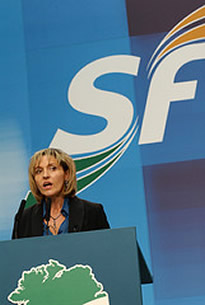 Foyle Sinn Féin MLA has said she is “disgusted” by what she described as republicans exploiting the grief of the families of the hunger strikers to attack her party.
Foyle Sinn Féin MLA has said she is “disgusted” by what she described as republicans exploiting the grief of the families of the hunger strikers to attack her party.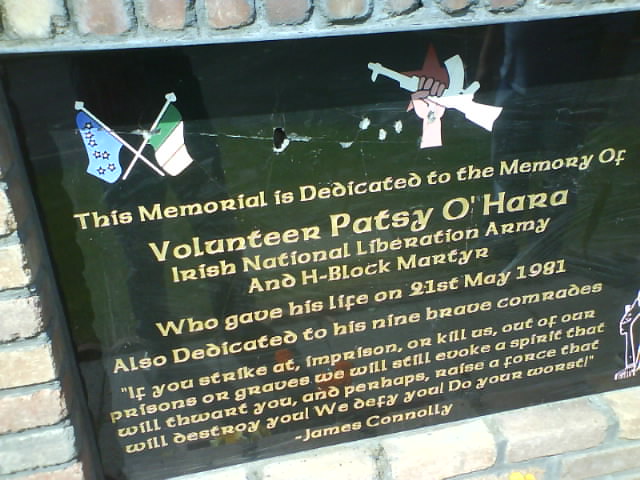
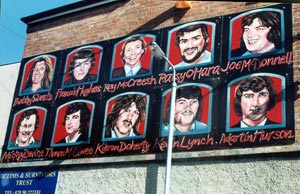

 Sinn Fein talked tactics while hunger strikers died
Sinn Fein talked tactics while hunger strikers died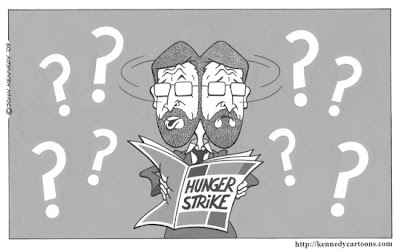


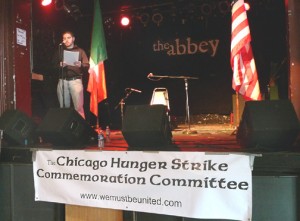 A chairde agus a chomrádaí,
A chairde agus a chomrádaí,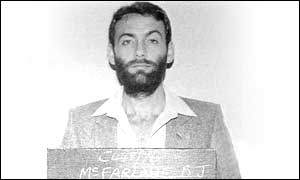
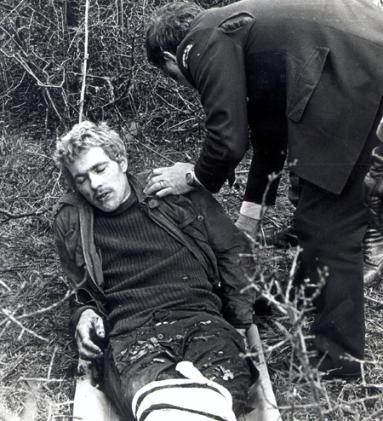
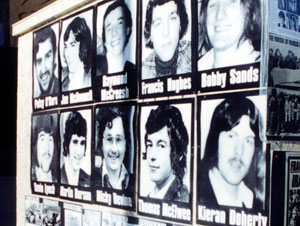
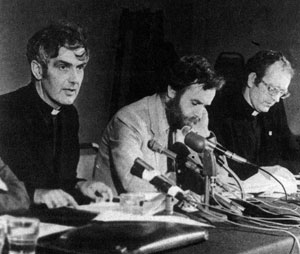
 It has withstood the blows of a million years, and will do so to the end.
It has withstood the blows of a million years, and will do so to the end.